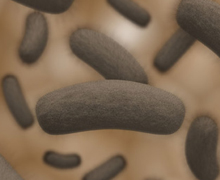
Researchers in Europe are excited about a new discovery that may lead to gains in treating and preventing Parkinson’s disease. Scientists from the Universities of Edinburgh and Dundee in Scotland reported in the journal Cell Reports they identified a specific strain of probiotic (healthy gut bacteria) that protected roundworms from the clumping of proteins in the brain associated with Parkinson’s.
The link between the gut microbiome and Parkinson’s disease was established through other studies and these researchers wanted to build on previous findings. They discovered the probiotic Bacillus subtilis not only provided protection from the formation but was also able to clear some clumps that had previously developed.
"The results provide an opportunity to investigate how changing the bacteria that make up our gut microbiome affects Parkinson's,” said lead researcher, Dr. Maria Doitsidou, from the Centre for Discovery Brain Sciences at the University of Edinburgh. “The next steps are to confirm these results in mice, followed by fast-tracked clinical trials since the probiotic we tested is already commercially available."
The brains of Parkinson’s sufferers are characterized by alpha-synuclein protein misfolds and builds ups that form toxic clumps. These clumps are responsible for the death of some nerve cells which starve the brain of dopamine and cause motor skills to diminish with visible symptoms such as tremors and slowness of movement.
"Parkinson's is the fastest growing neurological condition in the world,” said Dr. Beckie Port, research manager at Parkinson's UK, the organization that funded the reasearch. “Currently there is no treatment that can slow, reverse or protect someone from its progression but by funding projects like this, we're bringing forward the day when there will be.”
Scientists used roundworms altered to produce the human version of alpha-synuclein and wanted to find out if any over-the-counter probiotics could affect the formation of these toxic clumps. They found the answer in Bacillus subtilis. It kept alpha-synuclein clumps from forming by changing how enzymes in cells process certain types of fats called sphingolipids.
"Changes in the microorganisms in the gut are believed to play a role in the initiation of Parkinson's in some cases and are linked to certain symptoms, that's why there is ongoing research into gut health and probiotics,” Dr. Port said. "The results from this study are exciting as they show a link between bacteria in the gut and the protein at the heart of Parkinson's, alpha-synuclein. Studies that identify bacteria that are beneficial in Parkinson's have the potential to not only improve symptoms but could even protect people from developing the condition in the first place."
